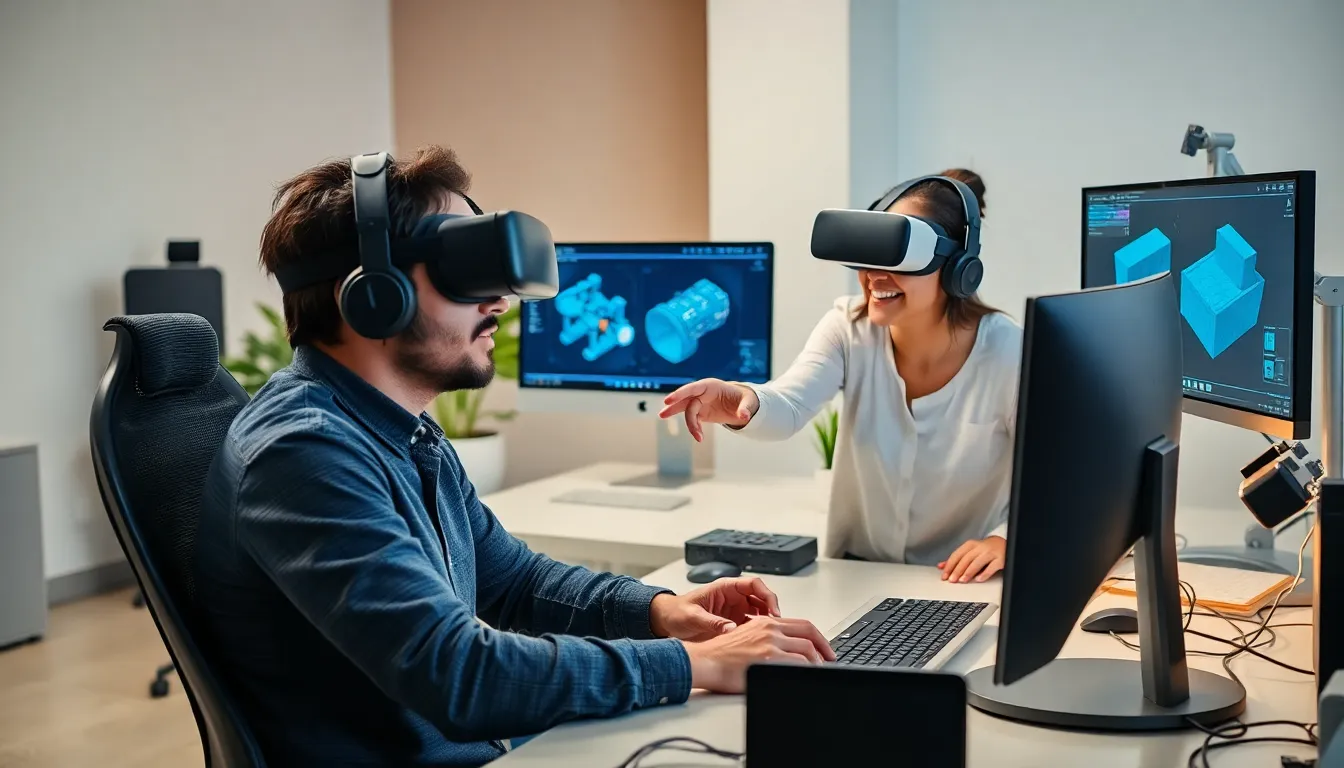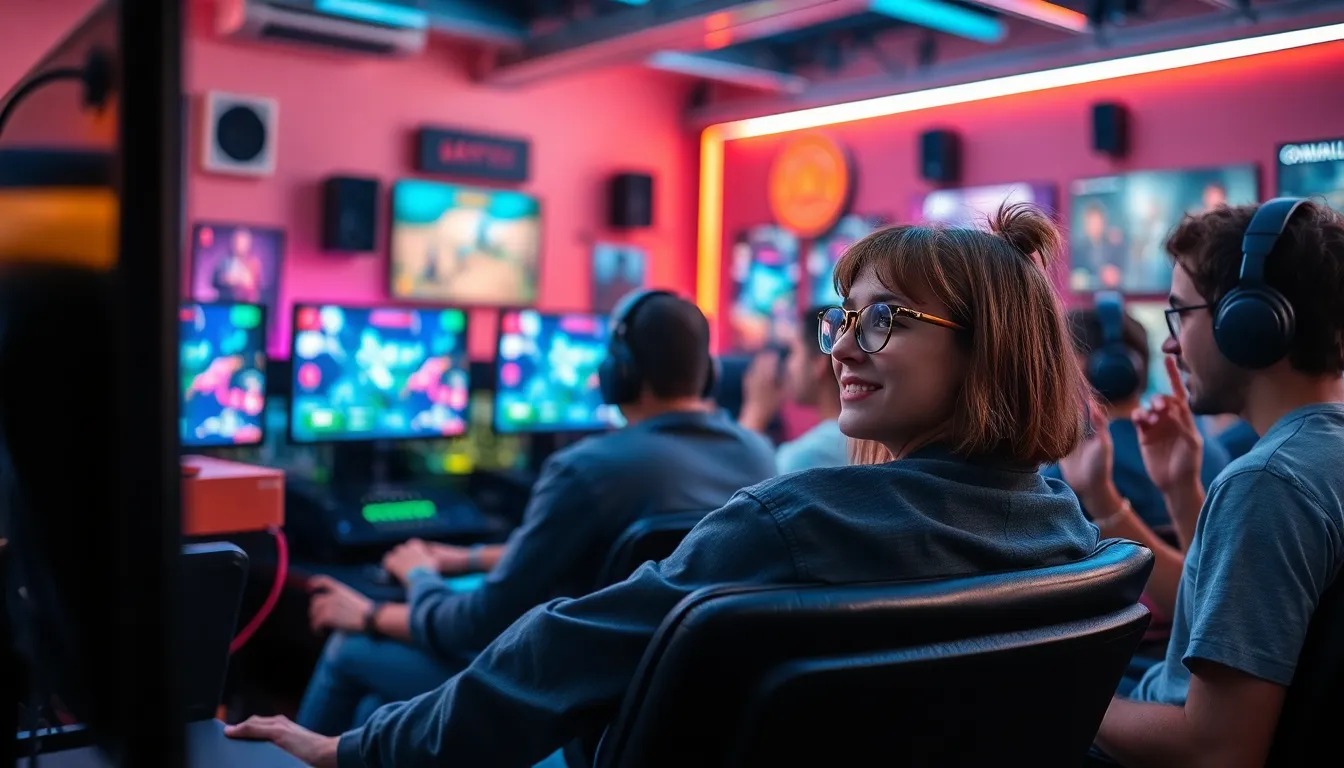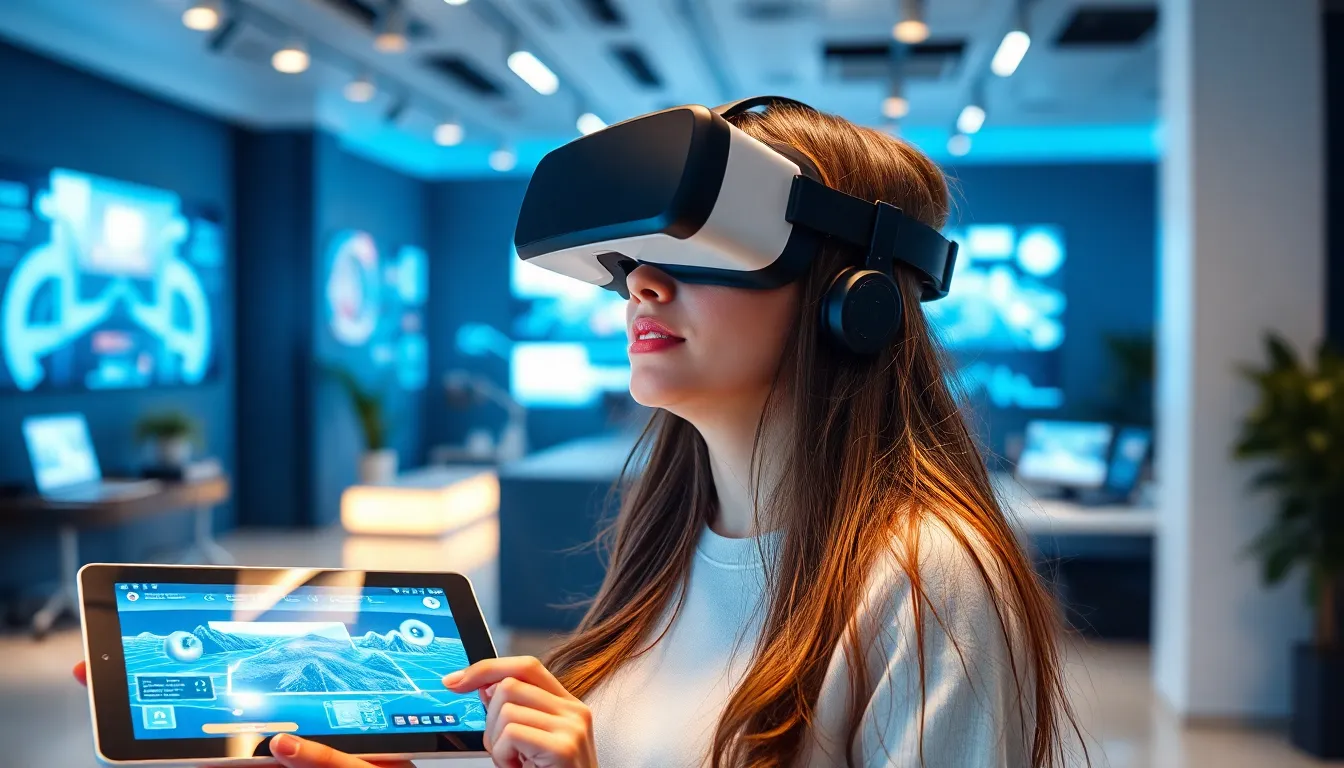Table of Contents
ToggleIn a world where reality often feels a bit too mundane, AR and VR developers are the wizards transforming the ordinary into the extraordinary. With a flick of their coding wands, they conjure immersive experiences that transport users to fantastical realms or enhance the world around them. Imagine slipping on a headset and finding yourself in a galaxy far, far away or pointing your phone at your living room and watching it morph into a cozy café.
These tech-savvy creators are not just playing games; they’re shaping the future of entertainment, education, and even healthcare. As industries scramble to hop on the AR/VR bandwagon, the demand for skilled developers is skyrocketing. So, whether you’re a seasoned coder or just curious about this magical realm, there’s never been a better time to dive into the enchanting world of AR and VR development.
Understanding AR VR Development
AR and VR development involves creating digital experiences that blend real and virtual environments. These technologies offer innovative solutions across various fields by enhancing user interaction.
What Is AR VR Development?
AR VR development creates applications that immerse users in augmented or virtual environments. Augmented reality overlays digital content onto the real world, while virtual reality constructs entirely immersive experiences. Developers utilize programming languages such as C# and C++ alongside engines like Unity and Unreal Engine to design these applications. They focus on creating user interfaces, optimizing performance, and ensuring cross-platform compatibility. Developers play a crucial role in blending graphics, audio, and user inputs to craft seamless experiences.
Importance of AR VR Developers
AR VR developers are essential in driving innovation and enhancing user experiences. As industries recognize the potential of immersive technologies, skilled developers become increasingly vital. In the entertainment sector, they create engaging gaming experiences. In education, they develop interactive simulations that improve learning outcomes. Within healthcare, AR VR solutions assist in training professionals and enhancing patient care. According to market analyses, the demand for AR VR developers is projected to surge substantially in the coming years, making expertise in this field highly valuable. Their expertise helps businesses stay competitive and push the boundaries of what’s possible in technology.
Skills Required for AR VR Developers

AR and VR developers need a mix of technical and soft skills to thrive in the industry. Mastery of various programming languages and tools is essential, coupled with effective communication and teamwork abilities.
Technical Skills
Developers must possess proficiency in programming languages such as C# and C++. Familiarity with engines like Unity and Unreal Engine plays a critical role in developing immersive experiences. Knowledge of 3D modeling software aids in creating realistic environments. Understanding APIs enhances integration across platforms. Familiarity with graphics and audio programming increases the quality of the final product. Debugging skills ensure smooth functionality and user experience.
Soft Skills
Effective communication is crucial for AR and VR developers. They must articulate complex concepts to team members and stakeholders clearly. Collaboration with artists, designers, and project managers often occurs, making teamwork vital. Adaptability allows developers to adjust to evolving technologies and trends in the industry. Problem-solving abilities help tackle challenges during the development process. Creativity fuels innovation, enabling developers to design unique and engaging experiences.
Tools and Technologies for AR VR Development
Technological tools play a crucial role in AR and VR development. These tools facilitate the creation of immersive experiences and significantly enhance user interaction.
Popular Development Platforms
Unity stands out as a leading platform due to its user-friendly interface and extensive asset store. Unreal Engine follows closely, offering high-fidelity graphics for realistic environments. Both platforms allow developers to create applications for various devices, including mobile phones and head-mounted displays. Additionally, ARKit and ARCore provide essential frameworks for AR development on iOS and Android devices, respectively. These platforms streamline the process, enabling developers to focus on innovation while leveraging powerful tools.
Programming Languages Used
C# is widely used for scripting in Unity, making it accessible for many developers. C++ serves as a backbone for Unreal Engine, allowing in-depth control over performance. JavaScript and Python also find applications in AR and VR development, particularly for web-based experiences. Furthermore, understanding GLSL for graphics programming adds value in creating stunning visuals. Mastery of these languages equips developers with the skills necessary to craft engaging applications tailored to their audiences.
Career Paths for AR VR Developers
AR and VR developers enjoy diverse career paths, with numerous opportunities across multiple sectors. These professionals play crucial roles in shaping the future of digital experiences.
Job Opportunities
Developers can find positions ranging from AR/VR software engineers to UI/UX designers. Companies actively seek experts to create engaging experiences in fields like gaming and education. Startups often promote innovation by hiring developers who can push creative boundaries. In healthcare, AR/VR developers contribute to medical training simulations to enhance skills in real-life scenarios. Freelancing also presents a viable option, enabling developers to undertake various projects while maintaining flexibility.
Potential Industries
Entertainment remains a primary industry benefiting from AR and VR technologies. Video game developers rely heavily on these immersive tools to create captivating gameplay. Education systems incorporate AR and VR for interactive learning experiences that stimulate student engagement. In healthcare, practitioners use simulations for training medical professionals and improving patient care. Retail companies employ AR to enhance customer experiences, allowing users to visualize products in real time. Those entering AR and VR development can expect a dynamic landscape filled with opportunities across these thriving industries.
The future of AR and VR development is bright and full of potential. As industries continue to embrace these technologies the demand for skilled developers will only increase. Those looking to enter this field will find numerous opportunities to innovate and create impactful experiences.
With a solid foundation in programming and a passion for immersive design developers can carve out successful careers in various sectors. Whether it’s crafting engaging games or enhancing educational tools the possibilities are endless.
Investing time in learning the necessary skills and tools can lead to a rewarding journey in the ever-evolving world of AR and VR.







